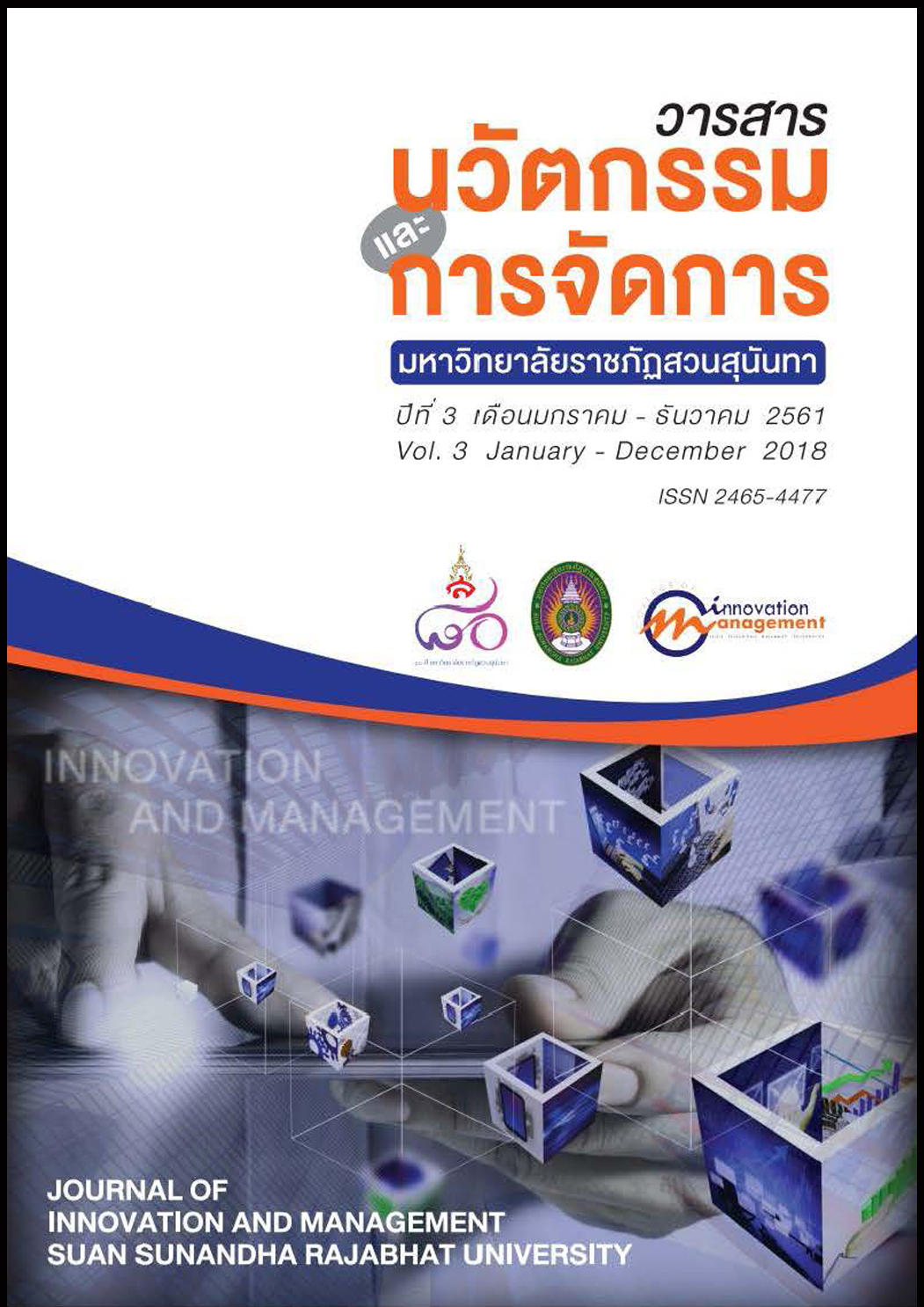Roles of government and private sectors in developing logistics management systems of truck transport operators of small and medium enterprises in Thailand
Keywords:
Role, Logistics management, Transport, Truck, SMEsAbstract
The roles of government and private sectors in the development of logistics management system in the context of truck transport operators, small and medium enterprises in Thailand should be integrated. This cooperation includes (1) plan the integration plan, (2) central organization selection, (3) human resource management, (4) control tracking, (5) the application of modern technology systems, (6) legislation that facilitates the road transport, and (7) create a network of alliances, business partnerships between government sectors, private sectors, financial institution, educational institution, research and development Institute, consumers and foreign businesses to create links from the national and regional strategic plans to enhance the management of the public and private sectors on the development of logistics management systems for truck operators, medium-sized enterprises and small size in Thailand. This is considered the foundation of the road transport sector and logistics systems to be developed for effective competition and resulting in the economic system of Thailand to be able to be strongly and stably driven and competitive at the world level.
References
2. เกศรา ใจจันทร์และอภิขาติ ใครแสง. (2551). ขีดความสามารถของยุคลากรต้านโลจิสติกส์ : กรณีพนักงานขับรถสำหรับสาขาขนส่งสินค้าและขนส่งโดยสารในเขตภาคเหนือ ตอนบน. เอกสารการประชุมเชิงวิชาการประจำปี ด้านการจัดการโซ่อุปทานและโลจิสติกส์ ครั้งที่ 8. 20-22 พฤศจิกายน. โรงแรมลองบีช ชะอำ, เพชรบุรี.
3. คณะวิศวกรรมศาสตร์. (2553). คู่มือพัฒนาศักยภาพผู้ประกอบการขนส่งด้วยรถบรรทุก. กรุงเทพฯ : มหาวิทยาลัยเกษตรศาสตร์.
4. คำนาย อภิปรัชญาสกุล.(2553). โลจิสติกส์และโซ่อุปทาน. กรุงเทพฯ : โฟกัสมิเดีย แอนด์ พับ ริซซิ่ง.
5. เจรจาการค้าระหว่างประเทศ, กรมธุรกิจบริการโลจิสติกส์. (2555). เข้าถึงเมื่อ 10 มิถุนายน เข้าถึงได้ จาก http://vwvw.dtn.go.th/filesuploacl/aec/images/logis25- 05-55. pdf.
6. ขัยอนันต์ สมุทวณิช. (2554). รัฐกับสังคมไตรสักษณรัฐไทยโนพหุสังคมสยาม. กรุงเทพฯ : พี.เพรส
7. ไชยยศ ไชยมื่นคงและมยุรา พันธุไชยมื่นคง.(2550). กลยุทธ์โลจิสติกส์และซัพพลายเซนเพื่อแข่งขันในตลาดโลก. นนทบุรี : ซี.วาย.ซิซเท็ม พริ้นติ้ง.
8. เจติรัตน์ มีมาก, กัตยาพร เสมอใจและคมกถุซ ปติถุกน์ (2552). การจัดการธุรกิจขนาดย่อม. กรุงเทพฯ : ซีเอ็ดยูเคน.
9. ดวงพรรณ กรีชาญชัย. (2549). โลจิสติกส์และโซ่อุปทาน. จดหมายข่าวโลจิสติกส์และโซ่อุปทาน. ฉบับ 1.
10. ทวีศักดิ์ เทพพิทักษ์. (2550). การจัดการโลจิสติกส์. กรุงเทพฯ : เอ็กซเปอร์เน็ต.
11. ธนิต โสรัตน์. (2554). การพัฒนาระบบโลจิสติกส์ของประเทศไทย ปี 2553/2554. เข้าถึงเมื่อ 15 มิถุนายน เข้าถึงได้จาก http://vwvw.tanitsorat.com/view.php?id= 439.
12. รุธี พนมยงค์. (2547). การจัดการโลจิสติกส์ในประเทศไทย. กรุงเทพมหานคร:.
13. ส่งเสริมวิสาหกิจขนาดกลางและขนาดย่อม (สสว.), สำนักงาน. (2556). รายงานฉบับสมบูรณ์ โครงการส่งเสริม สถานการณ์การลงทุนของ SME’s ไทยในต่างประเทศ. เข้าถึงเมื่อกรกฎาคม เข้าถึงได้จาก http://www.sme.go.th/Lists/Editorlnput/DispForm.aspx?ID=557.
14. ส่งเสริมวิสาหกิจขนาดกลางและขนาดย่อม (สสว.), สำนักงาน. (2556).
15. สิทธิชัย ฝรั่งทอง. (2553). ขับเคลื่อนโลจิสติกส์ด้วยการตลาด. กรุงเทพฯ : เอ็กซเปอร์เน็ต.
16. Christian B and Carl M. 2011. Innovation management of logistics service providers Foundations, review, and research agenda. International Journal of Physical Distribution & Logistics Management Emerald Article. 41 (2), 187 - 218.
17. Grant DM, Lambert DM, stock JR & Ellram LM. (2006). Fundamentals of Logistics Management European Edition, Singapore : McGraw-Flill.
18. Lieb, R., Miller, J., (2002). The use of third-party logistics services by large US manufacturers, the 2000 survey. International Journal of Logistics: Research and Applications 5 (1), 1-12.
19. Photis M. Panayides. (2005'). The impact of organizational learning on relationship orientation, logistics service effectiveness and performance. Journal of ScienceDirect, 36. 6 8- 80.
20. McGinnis, M.A., Kohn, J.W., 2002. Logistics strategy-revisited. Journal of Business Logistics 2 (2). 1-13''.
21. Stock, J.R. and Lambert, D. M. (2001). strategic Logistics Management. 4 th. New York : McGraw-Flill.
22. World Bank (2012). Connecting to Compete 2012.Trade Logistics in the Global Economy. The Logistics Performance Index and Its Indicators. [Online]. Accessed 15June 2012. Available from http://web.worldbank.org/WBSITE/ EXTERNAL/TOPICS/l~RADE/o,„contentMDK^3188013~pagePK^10058 ~piPK^ 1 0 062~theSitePK^350 71, oo.html






